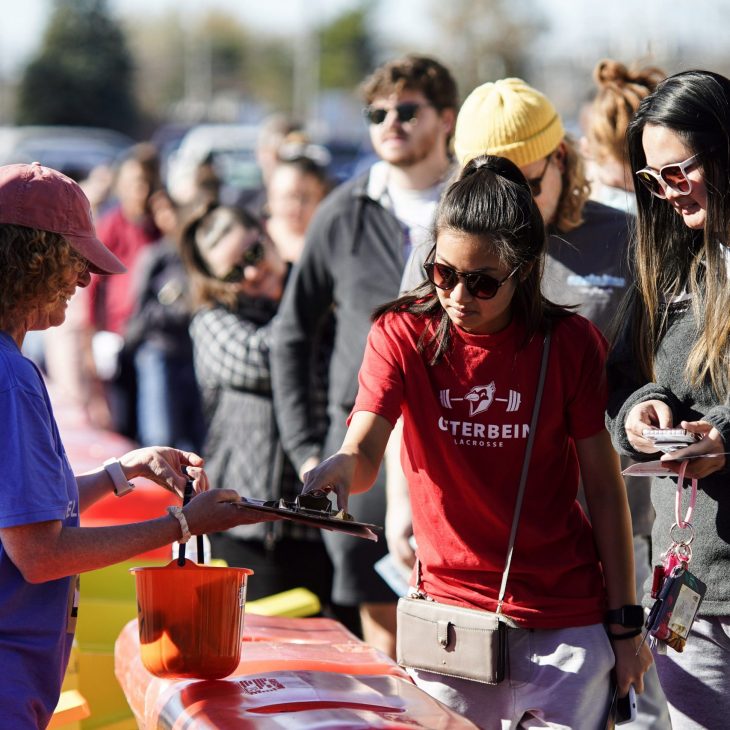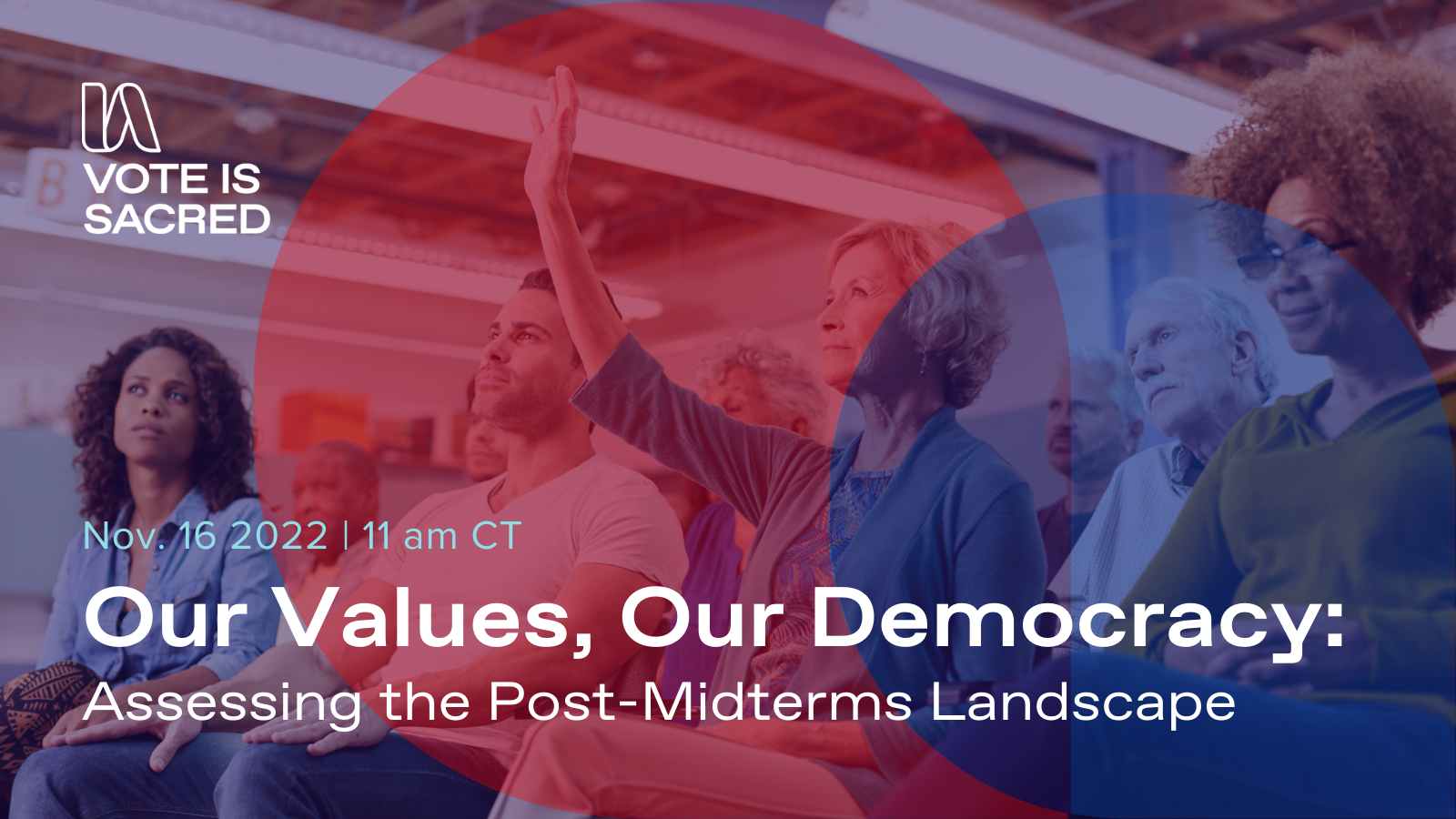The ’70 Faces of Torah’: A Jewish Commitment to a Better Democracy
November 7, 2022

Mary Ellen Giess, vice president of strategic initiatives at Interfaith America, sat down with Aaron Dorfman, the Executive Director of A More Perfect Union: The Jewish Partnership for Democracy, to discuss how his Jewish values and community inspire him to vote, live with disagreement, and work for a more perfect democracy.
This conversation was lightly edited for length and clarity.
Mary Ellen Giess: The idea of Interfaith America only exists with a strong democracy. As a nation, we were founded on religious and ethical beliefs that connect deeply to our democratic principles. How do your own religious beliefs inspire you to support the strength of our democracy?
Aaron Dorfman: Many of my political positions and democracy-related commitments are grounded in a particularly Jewish history and set of perspectives. For A More Perfect Union, however, one of the things we’ve been trying to do is to actually avoid grounding our work in Jewish values. I’ve spent most of my career doing Jewish education and social justice, deeply grounded in a set of Jewish values. But we’ve structured the work of A More Perfect Union based not on values, but rather based on history. As with every serious religion, there are many ways to invoke the religion in support of a lot of different political goals and policy perspectives, and that’s very true in the Jewish community as well.
One of the watch words of Judaism is that the Torah has 70 faces, everything is in there. By contrast, the way we’ve been structuring the work of A More Perfect Union is to say, Jews have it better in America than we’ve had it anywhere else in the Diaspora in 2,000 years. That’s true for the full range of Jewish life here, from Orthodox to secular Jews, from Republican to Democratic Jews, from Zionist to anti-Zionist Jews. Because of the vibrancy of American democracy, is multifaith, multiethnic potpourri of communities that make up this country, we’ve been able to thrive here. That’s true for the whole gamut of our community and all of its diversity. The reason we’re advocating for democracy so strongly is to allow us to have all the disagreements we have and live out all of our diversity and thrive as we have for so many years in the American context.

MEG: That makes a ton of sense from a community perspective. For you personally, what are the specifically Jewish values that you rely on for this work?
AD: I’ll invoke two sets of values. I’m a deep anti-essentialist, a counter-fundamentalist. When I was a child, my father’s advice was, when the group goes one way, go the other. There’s a way in which Judaism – with its 70 faces of Torah, and tradition of debate and argumentation which values evidence-based discourse and interrogation of motives and sources – lives out these ideas. Secondly, my Judaism is deeply grounded in a commitment to pluralism, a deep desire for us to be in relationship with people with whom we disagree. In my understanding of Jewish values, that’s part of the vibrancy of Judaism inside of itself and the role Judaism can play in a multifaith, multiethnic, multi-ideological community.
MEG: How do these religious values resonate with how you understand the founding principles of our nation?
AD: I don’t have a pollyannish view of our Founders – a bunch of white rich men with so many problems embedded in their collective identities and how those identities were expressed in our founding. I want to start with that caveat and awareness. At the same time, I think that the idea of building a new polity that was intentionally designed to be heterogeneous is powerful – creating space for different flavors of Protestants and Catholics and Jews representing lots of European national identities to co-exist – even if it was misogynist and racist and flawed. There was an intent to build something that isn’t designed to be more homogenous, isn’t designed to be monolithic, the intent of the Founders was to create the possibility for an expansion of that kind of pluralism.
Because the Jewish community, for most of its history, has been a tiny minority in the countries in which it has existed. For most of that history we existed in these places at the whim of the king or other leader. The king would allow us to be around as second-class citizens or not, and in the case of now allowing us to be around, we’d be expelled or killed. Here in America, it was baked into the DNA of this country that new people could show up and be at the table for figuring out what the future of the country would look like. It was an invitation to an experimental possibility that hasn’t existed elsewhere.
MEG: For many it feels like the very foundations of our democracy are being tested right now. How can religious communities and interfaith leaders support a free and fair election and build the strength of our democracy?
AD: The focus of our work has been to bring Jewish bodies and Jewish buildings to bear and support the machinery of American democracy. We have been out recruiting poll workers, nonpartisan poll monitors, encouraging Jewish institutions to use their buildings as polling sites, encouraging lawyers to support election officials who are targeted with frivolous lawsuits or violence. Religious communities are part of civil society, and they can play a role in backstopping the formal structures of American democracy.
Second, faith communities have a role to play in exercising their voices in support of democracy and in opposition to authoritarianism. Ideally, it feels very important that faith communities express their values in ways that cross religious lines and cross partisan lines; left-leaning and right-leaning religious leaders can see and give voice to a shared commitment to pluralism and democracy as a counter to anti-democratic or authoritarian agendas.
Finally, we need to be preparing for the possibility that things go badly. Some things are already going badly, but there are degrees of bad in losing our democracy. Relationship-building across religious lines and with other networks of civil society organizations is so important to be prepared to respond in the face of formal institutional failure but also to do more to protect for vulnerable communities, whether that includes people of color, low-income people, or Jews. In the last few weeks but more broadly in the past several years, we have seen a significant uptick in anti-Semitic violence. The Jewish community is acutely aware of both our relative success and influence in this country but also our ongoing vulnerability.
MEG: You’ve given me a great sense of your current work at A More Perfect Union. Where do you see this work going over time?
AD: When we launched, we were pretty clear that we wanted and needed to do work on the structures of democracy. That’s been the primary focus for us in these first nine months since we launched because there was a midterm election, because there are real significant needs for Jewish bodies and Jewish buildings to administer free, fair, safe, and accessible elections. We know elections are not democracy. We knew from the beginning that we also wanted to do meaningful work on democratic culture – civics education, social cohesion, efforts to counter toxic polarization and, to the extent that it’s possible, fostering a healthy information ecosystem. We’re deep in a research phase to try to figure out where the most meaningful areas of contribution are for us in the democratic culture space. We hope to have more clarity on that in early 2023.
MEG: In these early stages of your work, where have you experienced the greatest pushback or what have been some of the challenges you’ve navigated?
AD: There have been three areas of noteworthy resistance. First is among Jewish leaders and institutions who are allergic to politics. Anything that has a whiff of the political, these folks either worried about the legal capacity to engage or they are concerned about introducing something divisive in their communities. Second, we have encountered some resistance among organizations on the Jewish left, for whom protecting and strengthening a democracy that they consider deeply flawed or problematic from the beginning doesn’t feel like the right area to prioritize. Finally, we’ve gotten resistance from the Jewish right. I’m making generalizations here, because we’ve had many enthusiastic left-leaning and right-leaning supporters as well as many supporters in the apolitical center. But on the right, even though our work is unimpeachably nonpartisan, there is a sense that the pro-democracy space overlaps too strongly with the political left, and therefore folks on the political right are suspicious of it.
With those areas of pushback laid out, however, I’ve been amazed by the positive response from large mainstream centrist apolitical Jewish institutions like the JCC Association of North America. We’ve seen similar success with Jewish human service agencies and Jewish federations. Big, centrist, Jewish establishment networks recognize the threat environment we’re in currently, understand the significance of the challenges we’re facing, and want to bring their additional resources to bear to respond in ways that are nonpartisan, pro-democracy, involve taking some risk. I’ve been very inspired by this level of receptivity in the Jewish community.
MEG: That’s a hopeful story to leave us with and perhaps I’ll ask you to go deeper into that. What is your greatest hope for our democracy coming out of the 2022 midterms? What gives you cause for hope?
AD: There is increasing awareness across the Jewish community and between the Jewish community and unlikely allies that destabilization always leads to increases in extremism and increases in anti-Semitism. It’s a bad thing to be hopeful about, in a sense, but I’m hopeful that the increasing attention to those threats motivates more people to step into the arena. Do the work that needs to be done, recognize that democracy is not a spectator sport and doesn’t take care of itself, and that even though we’re fifteen years into a global democracy recession, that these expanding participants in democracy work will enable us to shift the tides against democracy.
Share
Related Articles
American Civic Life
Interfaith America Interview
American Civic Life
How Everyday People, and Humility, Give this Policy Maker Hope




